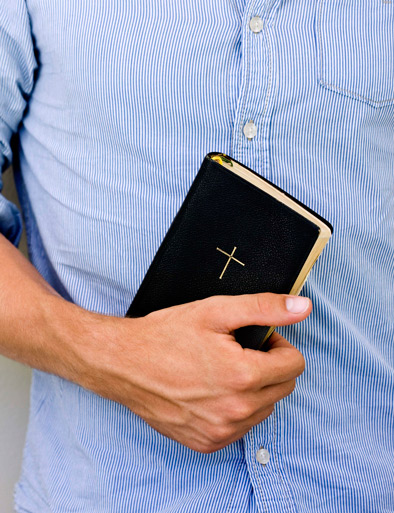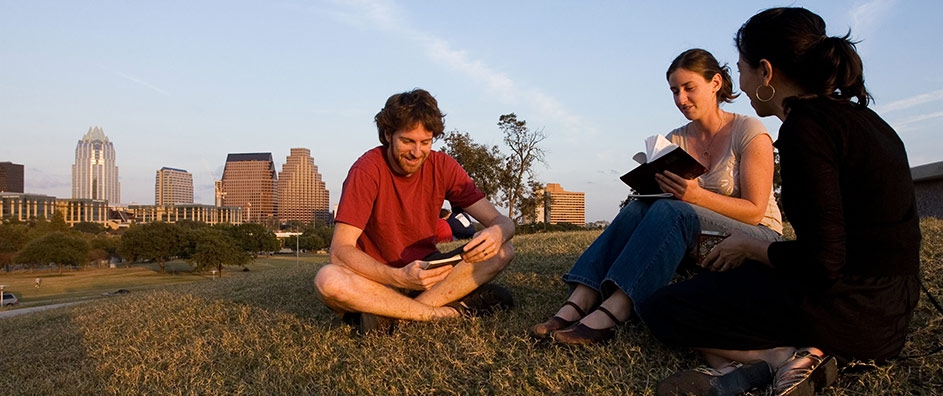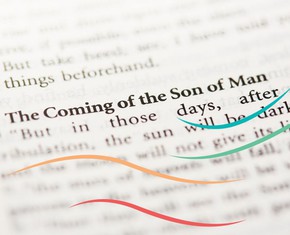The views expressed in our content reflect individual perspectives and do not represent the authoritative views of the Baha'i Faith.
Staring in mild disbelief, I saw the listing in the county paper — Baha’is of Forsyth County. These people actually existed, and they lived in my town. All of this couldn’t be an accident. So I called the phone number listed, and a woman picked up. She let me know all of the upcoming events in the Baha’i community, and invited me to an informal Q&A session she called a “fireside” at a family’s home that weekend. She sounded pleasant. I told her I would come, but I didn’t tell her that I was bringing my marked-up Bible and a lot of questions.
Before I went to the fireside, I knew I already liked the Baha’i idea of the oneness of humanity. My hometown has changed a lot in the last 15 years, but back then it was 96% white, and I rarely saw anyone who looked different.
 When I showed up at this “fireside,” I met all kinds of people: white, black, Persians (whom I had never encountered before) –from everywhere. Not only that, they ran the whole gamut of the socio-economic scale: an electrician who owned his own business, a nurse, a sportswriter for the local paper, a couple of people in marketing, hotel management, you name it. I met richer people and poorer people, but you would never be able to tell from how they interacted with one another. These people obviously cared about each other. You could see it in the way they talked, the way they played with the children in the room, and the gentle jokes they made at one another.
When I showed up at this “fireside,” I met all kinds of people: white, black, Persians (whom I had never encountered before) –from everywhere. Not only that, they ran the whole gamut of the socio-economic scale: an electrician who owned his own business, a nurse, a sportswriter for the local paper, a couple of people in marketing, hotel management, you name it. I met richer people and poorer people, but you would never be able to tell from how they interacted with one another. These people obviously cared about each other. You could see it in the way they talked, the way they played with the children in the room, and the gentle jokes they made at one another.
I had never seen anything like it in my life.
I don’t think of anybody in my family as really racist, but I had never seen people from such diverse backgrounds getting along, much less acting like family. This oneness of humanity stuff in the Baha’i Writings I had been reading, well, I thought it sounded great (perhaps a bit naive) –but I didn’t expect it could ever happen in my lifetime, and not here, in any case.
Anyway, I had questions to ask.
After everyone had been introduced, a speaker talked a little about the principles of the Faith, such as independent investigation of truth, the equality of men and women, the oneness of God, racial equality, and the oneness of religions. I boldly interrupted the speaker mid-speech: “Okay, you talked about the oneness of the major religions and their Messengers, but that makes Jesus seem like just one of many. In the Bible, Jesus says that ‘No one comes to the Father except through me.’ How can you reconcile that?”
Sadly, no one’s eyes bugged out in horror. The answer that I received, however, was truly radical. It shook me to my core.
“Remember that since God is unknowable in his essence, the only way we know him is from these Manifestations like Jesus, Buddha, Moses, or Baha’u’llah. So even though ‘Each Manifestation of God hath a distinct individuality, a definitely prescribed mission, a predestined Revelation, and specially designated limitations,’ they appear different to us not because God is different or changes, but because he always meets us where we are at our current stage of spiritual development as a species. For as long as we’ve been around in our history, God has been sending Manifestations of himself to guide us back to him and to fulfill our true destiny as the human race.
“On the other hand, the Baha’i Writings also say that:
…if thou callest [the Messengers] all by one name and dost ascribe to them the same attribute, thou hast not erred from the truth. – Baha’u’llah, Gleanings from the Writings of Baha’u’llah, p. 51.
“So in a very real sense,” the speaker said, “Jesus didn’t just get born in Bethlehem, preach the Gospel, die on the cross for our sins and be raised up after the third day; spiritually he was with us in the guise of every Manifestation for all of human history.”
That’s when it hit me: he was saying that my Jesus was bigger than I had ever imagined him to be. I had never ever considered that my vision of Jesus was too small. But there it was, from people that didn’t even wear the label Christian.
So yes, these people seemed different, all right. They made me feel included, were genuinely interested in my perspective, and encouraged me to ask them any question, even ones that might make them uncomfortable. They seemed to mirror the Baha’i concepts of unity in diversity, and they challenged me to make my vision of God bigger. I wasn’t sold yet, but my soul truly yearned to know more. Could the story about Baha’u’llah, the Prophet-Founder of the Baha’i Faith be true? I aimed to find out.
















Comments
Sign in or create an account
Continue with Googleor